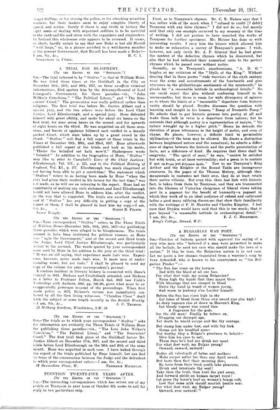Cro THE EDITOR or THE " SPECTATOR.")
Sum—Your correspondent "Stultus" refers to The Three Trials of William Hose—December 18th, 19th, 20th, 1817—for publishing three parodies which were alleged to be blaephemoue. The trials seemed to have been instituted for political reasons, as Hone Alas " agin the Government," and at the second and third trials the Judge, Lord Chief Justice Ellenboiough, was particularly unfair to the accused. The words quoted by your correspondent a ere used by Hone in his address to the jury at the third trial: " It was an old saying, that experience made fools wise. Experi- ence, however, never made fools wise. It made men of under- standing wiser, but not fools." I shall be pleased to send my copy of the volume for your correspondent's perusal.
A. curious incident in literary history is connected with Hone's funeral in 1849. Dickens and Cruikshauk attended, and Dickens in a letter to Professor Felton, March 2nd, 1843 (see Field's Yesterdays with Authors, 1882, pp. 146-48), gives what must he an exaggeratedly grotesque eccoout of the proceedings. When first mole public in 1872, Dickens's version was immediately con- tested by all the then living witnesses. "Claudius Clear" dealt with the subject at some length recently in the British Weekly.


































 Previous page
Previous page